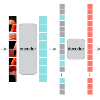We present an artificial intelligence system to remotely assess the motor performance of individuals with Parkinson's disease (PD). Participants performed a motor task (i.e., tapping fingers) in front of a webcam, and data from 250 global participants were rated by three expert neurologists following the Movement Disorder Society Unified Parkinson's Disease Rating Scale (MDS-UPDRS). The neurologists' ratings were highly reliable, with an intra-class correlation coefficient (ICC) of 0.88. We developed computer algorithms to obtain objective measurements that align with the MDS-UPDRS guideline and are strongly correlated with the neurologists' ratings. Our machine learning model trained on these measures outperformed an MDS-UPDRS certified rater, with a mean absolute error (MAE) of 0.59 compared to the rater's MAE of 0.79. However, the model performed slightly worse than the expert neurologists (0.53 MAE). The methodology can be replicated for similar motor tasks, providing the possibility of evaluating individuals with PD and other movement disorders remotely, objectively, and in areas with limited access to neurological care.
翻译:我们提出了一个人工智能系统,用于远程评估患有帕金森病(PD)的个体的运动表现。参与者在网络摄像头前进行了一个运动任务(即敲打手指),来自全球250个参与者的数据被三名专家神经学家根据运动障碍学会统一帕金森病评分量表(MDS-UPDRS)进行了评分。神经学家的评分非常可靠,具有0.88的ICC。我们开发了计算机算法,以获得符合MDS-UPDRS指南的客观测量结果,并与神经学家的评分强相关。我们的机器学习模型,该模型在这些测量结果上训练,在MAE为0.59的情况下比MDS-UPDRS认证评分员表现更好,但与专家神经学家(0.53 MAE)相比,该模型表现略差。该方法可以复制和适用于类似的运动任务,为在远程和有限访问神经照顾的区域中对患有PD和其他运动障碍的个体进行客观评估提供了可能。



